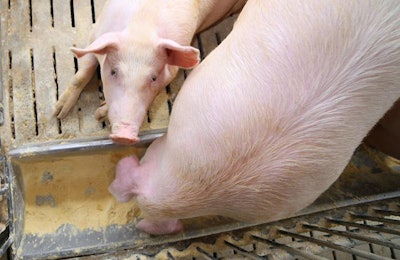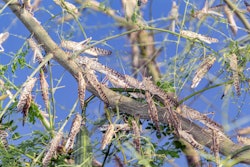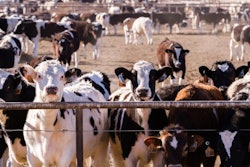
While there has been promising progress in the development of a vaccine against African swine fever (ASF), further cases have been recorded in several regions.
Prospects for an effective vaccine to control African swine fever (ASF) in pigs have come into sharper focus over recent days. Researchers have developed a vaccine that protected all of the immunized pigs from the disease.
Together with co-workers in Spain and the U.S., scientists based at the Pirbright Institute in the United Kingdom (U.K.) first created a vectored vaccine. This uses a harmless virus to deliver into pig cells eight selected genes from the ASF virus genome. Behind the idea is that the genes produce viral proteins, which stimulate the pig’s immune system to respond to a subsequent ASF infection.
As the team reports in their paper in the journal Vaccines, all the pigs immunized in this way survived the infection, and were protected when challenged with a potentially lethal ASF virus. The animals developed clinical symptoms, but they survived.
New vaccine offers protection, differentiation, safety
Lead author of the paper and head of the ASF Vaccinology Group at the Pirbright Institute, Dr. Chris Netherton, commented on the significance of the findings.
“It is very encouraging to see that the genes we have selected are able to protect pigs against ASF,” he said. “Although the pigs showed clinical signs of infection after challenge with the virus, our study has shown for the first time that a vectored vaccine against ASF is a realistic possibility.”
Netherton added that this type of vaccine allows vaccinated animals to be differentiated from those that have been naturally infected by the ASF virus (DIVA). This feature is of crucial economic importance. It allows vaccination programs to be developed without impacting trade. If this had not been the case, trade in pig meat, for example, may not proceed as there would be no way to distinguish vaccinated animals from those that had been infected.
Next step in the development of the vaccine is for the team to investigate how the pig’s immune system responds to the proteins produced by the virus genes. This will enable the team to improve the efficacy of the vaccine.
In the research paper, the authors explain that classical approaches to ASF vaccine development have not been successful. Using inactivated virus does not offer protection, while live attenuated viruses generated by passage in tissue culture are not always safe.
ASF returns to Ukraine, more cases on Romania
After a brief absence, Ukraine’s veterinary authority has reported the return of ASF to the southern oblast of Zaporozhia. Virus was detected at a farm with 150 pigs after four of the animals died, according to the official report to the World Organisation for Animal Health (OIE). The rest of the herd was culled to halt the further spread of the disease. ASF was last detected in this area in April.
Affecting nine small backyard herds and one farm, there have been a further 10 ASF outbreaks among Romania’s domestic pigs. Infections were confirmed between April 20 and May 13, according to the official OIE report.
At the farm in Mehedinti county, 24 of the 4,022 pigs died. Culling was ongoing as the report was submitted. In the southwest of Romania, this county shares borders with Bulgaria and Serbia.
ASF situation in domestic pigs in Europe
Up to May 17, the European Commission (EC) has registered a total of 274 ASF outbreaks in domestic pigs in Europe so far this year through its Animal Disease Notification System (ADNS).The latest total represents an increase of 21 from the previous report dated May 6, and all were in Romania.
From this source, by far worst affected country has been Romania (247 outbreaks), followed by Bulgaria with 17. Also reporting cases were Ukraine (5 outbreaks), Poland (2), and Greece, Lithuania and Moldova, each with one outbreak.
Cases in European wild boar exceed 6,000
The number of wild boar in Europe confirmed with ASF so far this year has risen to 6,048, according to the EC’s system, ADNS. This is an increase of 441 over a two-week period.
With 2,424 cases, Hungary has become the European state reporting the most cases in the wild species. Its tally has risen by 232 over the past two weeks, so that it has overtaken Poland. Over this period, the Polish total has risen by 128 to reach 2,395.
Other countries that have reported significant numbers of ASF-infected wild boar to the EC so far this year are Romania (468 cases), Bulgaria (319), Latvia (111), Slovakia (106) and Lithuania (96). Italy, Serbia, Estonia, Moldova, Ukraine, and Belgium have also confirmed ASF in wild boar this year, but in fewer than 45 animals.
Over the past week, four of these countries have reported new cases of ASF in wild boar to the OIE. In Hungary, a further 141 wild boar have tested positive for the ASF virus, including 117 animals in one cluster in the northeast. Also reporting new cases to the OIE were Romania (24 animals), Latvia (5) and Moldova (1).
During the whole of 2019, just over 6,400 ASF cases in European wild boar were recorded on the ADNS system.
Further outbreak at South African farm
With confirmation of new cases at a farm in Free State, South Africa’s total ASF outbreaks since April 2019 has reached 20.
Out of a herd of 60 pigs, 38 died, according to the agriculture department’s report to the OIE.
Occurring in four states, previous outbreaks have been widespread in the country, but all have been located outside the ASF Control Zone.
Six new cases in South Korean wild boar
South Korea’s agriculture ministry has informed the OIE about a further six wild boar that have tested positive for the ASF virus. All were found in regions near the northern border where previous cases have been confirmed.
Following devastating losses of their respective national pig herds from ASF, both China and Vietnam are rebuilding their pig sectors. In China, pork production will fully recover by 2021, according to the country’s largest feed producer. Meanwhile, Vietnam is importing breeding stock from Thailand.
View our continuing coverage of the global African swine fever situation.

















